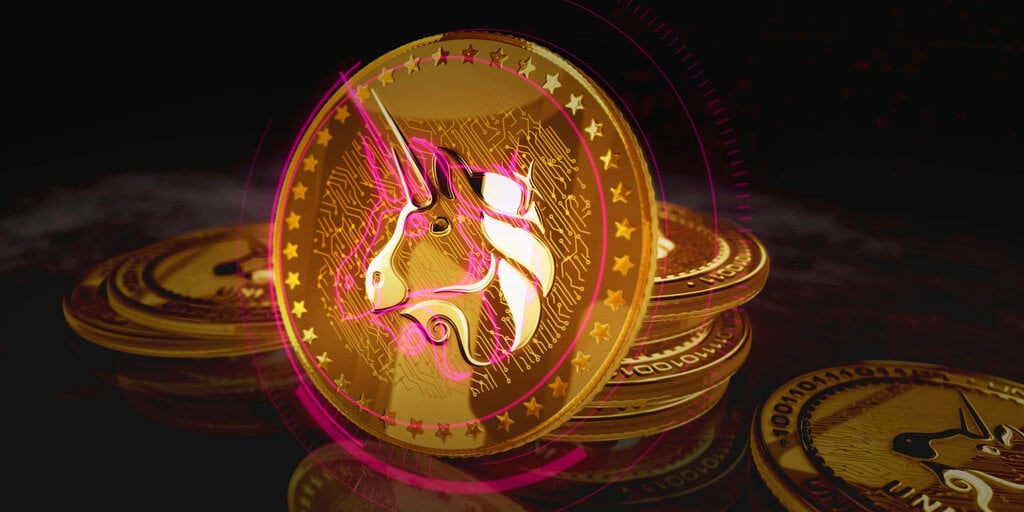The inventor of leading decentralized exchange Uniswap, Hayden Adams, announced today that the protocol will be implementing a 0.15% swap fee on their web app and wallet interfaces for the very first time.
Only a certain set of tokens will be affected by the new fee, according to a Uniswap Labs’ blog post, including ETH, USDC, WETH, USDT, DAI, WBTC, agEUR, GUSD, LUSD, EUROC, and XSGD.
However, the fee only applies when traded through Uniswap Labs’ interfaces on mainnet and supported layer 2s—and if the swap takes place between an input and output that are both subject to the fee. Swaps from stablecoins to stablecoins are excluded from this initial charge.
Bridgett Frey, a spokeswoman for Uniswap Labs, told Decrypt that they took a “holistic view at how people use our product, and determined this initial list of tokens that made most sense,” adding that they expect it to evolve over time.
The new fee is set to go live tomorrow, and according to Adams, will allow Uniswap Labs “to continue to research, develop, build, ship, improve, and expand crypto and DeFi.”
Other leaders in the Web3 space said the move was a reasonable one, with Gnosis cofounder Martin Koppelmann saying it was “good news.”
”If we want to have resilient systems that work at scale there needs to be entities that have a sustainable income,” Koppelmann wrote on Twitter, suggesting another fee would make sense.
Uniswap charging a frontend fee is good news. If we want to have resilient systems that work at scale there needs to be entities that have a sustainable income – I hope next the onchain fee switch will follow. https://t.co/Z9d4ZjVPoN
— Martin Köppelmann 🦉💳 (@koeppelmann) October 16, 2023
Not everyone is on board, however, with widespread backlash seen on Crypto Twitter.
Gabriel Shapiro, general counsel for Delphi Labs, a Web3 research and development platform, has been sounding the alarm on Twitter for years, denouncing what he calls “non-exit liquidity,” something he said has been implemented by venture capital as it has increasingly moves into the space.
Shapiro told Decrypt that the problem is that investors (such as those in the $1.66 billion Series B Uniswap Labs closed last year) have “consistently resisted allowing any value accrual to [Uniswap], but in the meantime have used the token to get liquidity.”
How? By not implementing the fee switch, Shapiro explained.
The fee switch would allow the Uniswap community to redirect a portion of the protocol’s fee revenues to governance. The latest vote for implementation was rejected back in early June.
Interestingly, Shapiro’s views resonated with those of Web3 VC investor Nic Carter, a partner at Castle Island Ventures. He wrote on Twitter that he has “never seen a situation more demonstrative of equity value siphoning token value” than Uniswap, resulting in “token holders being at odds with shareholders.”
Carter and Shapiro note that Uniswap investors hold more equity than UNI tokens, thus creating a misalignment between the groups.
Ari Paul, founder and CIO of BlockTower capital, took a nuanced view on the controversy, understanding that it’s “reasonable” to charge fees, but that UNI holders are “likely to get ripped off” due to what he called an awkward mismatch of incentives.
That said, according to Shapiro, Uniswap initially added the fee switch as “a value driver expectation.” He said that people buy tokens with these types of features “based on hopium” that the fee switch will get implemented and that’s how the protocol will be monetized.
The Web3 attorney thinks that the fee switch could still be turned on—“but let’s face it, users have limited appetite for fees.” He noted that “every fee that applies somewhere in the stack makes it less likely a large in-protocol fee is sustainable and comes right out of the pocket of UNI holders.”
Both Carter and Shapiro’s views were backed by pseudonymous account Autism Capital, which pointed out that the UNI fee switch is voted on by governance, but that Adams and the “unicorn sparkle crew” don’t disclose that their friends and VCs and have “aggregated control of the supply, thus voting power, and decision making.”
Despite these cries of foul play, plenty of supporters came out to back the newly instantiated fee–some pointing to a much needed direction for building a sustainable business path, whereas others highlighted the protocol continues to be permissionless and “no one is forced to pay the fee.”
Stay on top of crypto news, get daily updates in your inbox.
Source: https://decrypt.co/201881/ethereum-defi-exchange-uniswap-adds-fees-sparks-controversy


